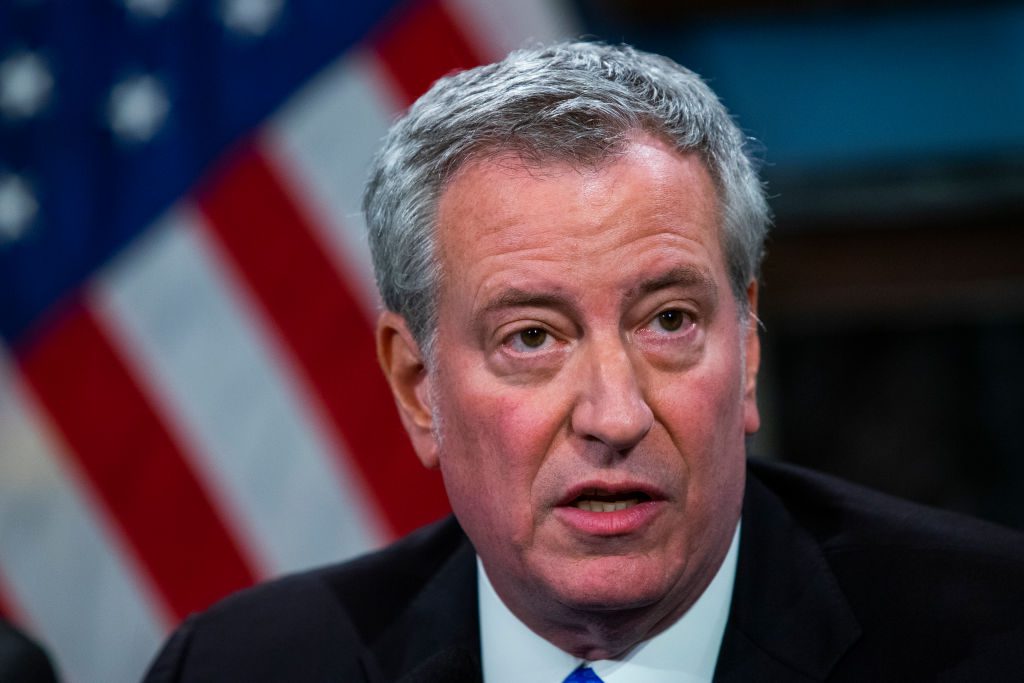Abandoning Broken-Windows Policing, de Blasio Invites Disaster

Two New York City mayors are feuding over the alarming increase in antisemitic attacks in Brooklyn and Manhattan in recent weeks. Former mayor Rudy Giuliani has accused current Mayor Bill de Blasio of being responsible because he failed “to learn lessons from the Holocaust.” In fairness, de Blasio is likely aware that the Shoah began with the defaming of Jews, which later turned into physical assaults and eventually death camps. This, however, does not absolve him of culpability.
Giuliani is correct in the sense that de Blasio is responsible for New York City’s comprehensive decline: the new crisis of disorder, our diminished quality of life above ground and the consistent harassment in the subways below, the 2019 increase in violent crime, and now the rise of antisemitic attacks.
This is not the return of history. As the late, great Charles Krauthammer said, decline is a choice. When de Blasio abandoned broken-windows policing, he chose to consign a city of 8.6 million to fate and a naïve progressive’s hope that bad actors would not indulge their revanchist impulses. They have, and their successes over the last six years have been impressive. Belligerent beggars, aggressive vagrants, and juvenile delinquents now accost taxpayers and tourists with impunity, from Times Square to the 2 train. Violent crime has also made a comeback. In 2019, murder, rapes, robberies, shootings, and assaults were all up over the previous year.
Broken-windows policing maintains order by addressing the small acts of anti-social behavior—think disorderly conduct, fare beating, vandalism, aggressive begging, open drug use—that, when tolerated, encourage criminals to commit more serious offenses. The theory’s architects explained that a building with “one unrepaired broken window is a signal that no one cares, so breaking more windows costs nothing.” Before you know it, “vandals break a few more windows” and eventually “break into the building.” Repair the broken window, prevent the burglary. Arrest the fare beater, reduce subway assaults. Even de Blasio conceded that “the underlying principle was the right principle, which is you address little things that come from big things,” his cognitive dissonance notwithstanding.
By retreating from this proven strategy, informal societal controls were weakened and de Blasio’s permissive approach to deviance enabled the repugnant social contagion of antisemitism to flourish. When the fevered minds harboring religious hatred observed the incremental breakdown of social order, they understood that it “costs nothing” to act on their diseased prejudices. The first antisemitic attack—which the mayor limply condemned for its “affront to our city’s values” rather than its intrinsic and absolute evil—on December 23, 2019, “is, in effect, the first broken window.” Over the last three weeks, there have been at least 13 of these attacks in New York.
Thus, when Giuliani said de Blasio has “ruined things that I worked [on] 24 hours a day,” he was right. For the last six years, New York City has been living off the Giuliani-Bloomberg inheritance. But the disordered atmosphere de Blasio tolerates in the subway is the same in which the criminally antisemitic feel empowered to act. Our inheritance, in other words, has been depleted.
On New Years Day 2018, de Blasio gave his second inaugural address and announced “what the next four years will be like.” He told New Yorkers: “Something big is happening in New York City, something new, something different, something that has begun a new progressive era in this city’s history.” We know what this “new progressive era” looks like, and concerned New Yorkers are clamoring for a return to the status quo ante of the Giuliani-Bloomberg years.
On the upside, de Blasio is term-limited out in 2021, though this will provide little comfort to those Jewish New Yorkers who no longer feel safe in their own communities. If de Blasio’s first term was defined by his surrender to lawlessness masquerading as reform, then his second term will be remembered for his failure to respond forcefully to antisemitic violence.
Since New Yorkers cannot expect de Blasio to accept responsibility, it falls to imperious liberal Democrat and de Blasio antagonist Governor Andrew Cuomo to do the right thing. If Cuomo has an ounce of moral courage, rather than a petulant child’s instinct to torment, he will exercise his power under the city charter and state constitution to remove de Blasio for maladministration in the face of a public safety crisis that the mayor has not only tolerated but hastened. If not, it will only get worse.
Craig Trainor is a criminal defense and civil rights attorney in New York City. Follow him on Twitter @TrainorLaw.
Comments